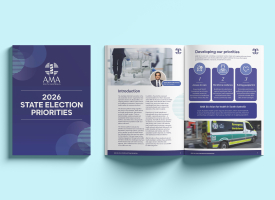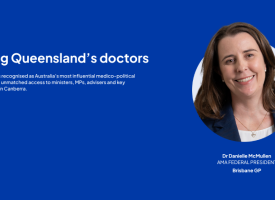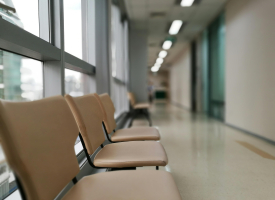Transcript: ABC Radio - Non-GP specialist fees
AMA SA President Associate Professor Peter Subramaniam spoke to ABC Radio Journalist Viki Ntafillis about the Grattan Institute's report into non-GP specialist fees. He says it highlights the urgent need for reforms to ensure Medicare rebates keep pace with the rising costs of delivering timely, high-quality healthcare to all Australians.

Transcript: AMA SA President Associate Professor Peter Subramaniam on ABC Radio Port Pirie and syndicated across Regional South Australia.
(17 June, 2025)
Subjects: specialist fees, Medicare, Grattan Institute
Viki Ntafillis: The Grattan Institute report has received a lot of attention. What’s the AMA’s response?
A/Prof Peter Subramaniam: The AMA welcomes the report—both nationally and here in South Australia. It’s not just about fees; it also highlights a major issue: we don’t have the right specialists in the right places. For example, towns like Port Pirie, Berri, Whyalla, and Port Augusta are underserved. Sometimes that’s due to a lack of critical mass to support full-time specialist services. But there are ways to improve access, such as training the right specialists and supporting outreach services where specialists travel to regional areas.
Viki Ntafillis: The report also discusses fees. What’s the AMA’s position on that?
A/Prof Peter Subramaniam: The AMA has never supported egregious billing. We believe patients should be informed of their options, including public outpatient clinics. But for country patients, the wait times in the public system can be long, which is a real concern. The report rightly points out that we haven’t invested enough in outpatient services for underserved communities.
Viki Ntafillis: Are there any financial support schemes for regional patients needing specialist care?
A/Prof Peter Subramaniam: Yes. The Patient Assistance Transport Scheme (PATS) helps cover travel costs for patients needing to visit specialists in the city. But beyond financial support, we need to improve the first point of care. I’ve worked in the Riverland for over 24 years, and I’ve seen many patients referred to me who didn’t actually need specialist care. That’s not the GPs’ fault—they’re under pressure, especially with Medicare rebates not keeping up. Sometimes referrals happen simply because GPs don’t have the time or resources to manage complex cases.
Viki Ntafillis: You mentioned the need for a better first point of care. What should be implemented?
A/Prof Peter Subramaniam: The AMA has consistently advocated for better access to GP care in rural and regional South Australia. GPs need to be supported by a network of specialists they can refer to, speak with, and access in a timely way. We also need to think of the healthcare system as a whole, rather than as fragmented parts. Right now, GPs are funded by the Commonwealth, and hospitals by the state. That disconnect needs to be addressed.
One of the key recommendations in the report is to invest in public hospital outpatient clinics. If you’re in Port Pirie and need a specialist, you shouldn’t have to wait months or travel to Adelaide. We also need a Medicare Benefits Schedule that reflects the real cost of care. That would make services like radiology, paediatric care, and specialist outreach viable in regional towns.
Viki Ntafillis: Is there anything in the report the AMA SA branch disagrees with?
A/Prof Peter Subramaniam: The focus on egregious fees has taken up a lot of attention, but that’s just one of 16 recommendations. We don’t support excessive fees or leaving patients without affordable options. Many specialists already adjust their fees based on a patient’s financial situation.
What we really support are the broader recommendations:
• Increase public outpatient appointments, especially in regional areas.
• Improve communication between GPs and specialists—such as through a dedicated phone service.
• Address the lag in Medicare rebates, which haven’t kept up with the cost of delivering care.
It’s frustrating for everyone when a patient waits months to see a specialist, only to be told they didn’t need to be referred in the first place. That’s why reforming the system is so important.



